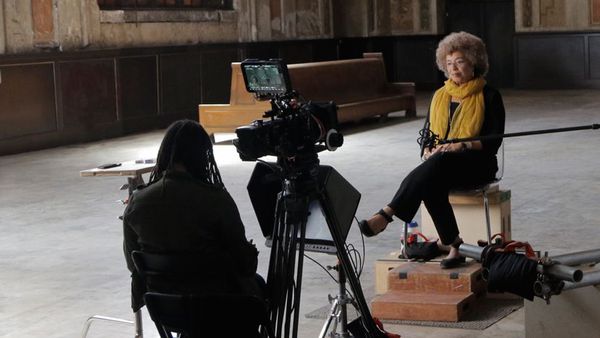Eye For Film >> Movies >> 13th (2016) Film Review
13th
Reviewed by: Owen Van Spall

Ava DuVernay’s (Selma) new documentary takes its title from the United States’s 13th Amendment. Introduced to abolish slavery, it states: “Neither slavery nor involuntary servitude, except as a punishment for crime whereof the party shall have been duly convicted, shall exist within the United States.” In a brisk 90 minutes, drawing on a variety of academics, activist and cultural commentators, including esteemed figures like Angela Davis, DuVernay’s film steamrollers over the notion that the passing of this act closed the book on the appalling inequalities faced by America’s black community.
In fact, several interviewees note the inherent flaw in the act itself: the wording “except as a punishment for crime” seemed designed to foreshadow how, in the absence of an explicit federal mandate to continue the industry of slavery after the Confederacy lost the Civil War, the means of generating wealth from black bodies and simultaneously denying them agency shifted, like a chameleon, into other channels. And one of those key channels was federal and state law enforcement tools, or what Davis calls “the prison-industrial complex”.

DuVernay’s film isn’t particularly stylistically memorable or novel in construction (there is a politically charged hip-hop score, and the word Criminal is flashed on screen in bold text whenever the word is mentioned by the interviewees, emphasising the way the black figure has been negatively contextualised in cultural dialogue) but it effectively assembles footage and facts in a relentless barrage that just overwhelms you, while confidently establishing connecting threads that have terrifying implications.
We are given plenty of disturbing facts that sketch out the dismal national picture today: the film opens with an address from Barack Obama, where he notes that America has almost five per cent of the world’s population and 25 per cent of the world’s prisoners. The lifetime likelihood of imprisonment of an American white male is 1 in 17, for blacks it is a shocking 1 in three. Black men are 6.5 per cent of the US population today, yet make up 40 per cent of the prison population. One commentator notes that more blacks now are under criminal supervision than were slaves back in the 1850s.
DuVernay’s film highlights the striking - and disgusting - speed at which the wheels of the state and various cultural institutions and voices moved after the end of slavery to establish this new form of dominion. Right after the Civil War, blacks were incarcerated en masse and put to work in industrial schemes, their labour still being extracted despite their new "freedom". Then there was roughly 100 years of Jim Crow legislation across the southern states, which helped drive what one commentator refers to as a “mass exodus from terror” as blacks fled to the northern and western cities. Despite the gains made during the Lyndon Johnson presidency - thanks in large part to the Civil Rights movement and figures like Martin Luther King and Malcolm X - the Nixon, Reagan and Bush administrations ran on explicit, dog-whistle “law and order" platforms that not only secured their southern base against Democrats, but massively expanded the war on drugs, militarised the police, and reduced judge’s decision making powers.
Blatant discrimination was baked into the system: thus possession of the fashionable white-favoured cocaine powder would earn a defendant a far lighter sentence than being caught with crack cocaine. The defeat of the Democrat Dukakis by George Bush senior in the 1988 election campaign involved the shameful exploitation of the image of a black criminal who it was claimed had struck while on a release programme from jail mandated by the Democrat challenger. Part of a long history of the association of the black body with crime (and rape and murder in particular) this racist election tactic helped burn into the Democrat Party the still-present fear of being seen as soft on crime, hence the Clinton administration’s refusal to change the general course of US policing and sentencing (for example, Clinton backed sentencing policies like California’s harsh “three strikes and you’re out”) and acceptance of the “super predator” rhetoric.
The sections of the film where we are shown how hard it is going to be to undo this mass incarceration system are particularly chilling, as there seems to be simply so much money and infrastructure now invested in the “prison industrial complex”, which has now blurred into part of the regular economy. Private companies now run prisons on behalf the US government, and secure influence in Congress and the Senate by combining their influence into lobbying groups (the ALEC foundation comes in for particular scrutiny, its pre-written bills securing corporate interests have appeared almost word-for-word on the House floor at times). Prisoners are a source of low cost labour, their toil flowing into any number of major brands. Various interviewees worry that the new nationwide dialogue on addressing sentencing imbalances and overpopulation of prisons masks a subtle corporate agenda to move on to privatising probation and monitoring, adapting to the new unacceptability of using prisons as a blunt instrument.
It can’t be denied DuVernay’s film has been released at a propitious time, as relations between the black community and the institutions of the state reach a particularly charged level, against the backdrop of many high profile killings of black individuals by police. The director doesn’t hesitate either to connect the ugly language of Trump, the "law and order" candidate in the current, fractiouspresidential election campaign, to the irrational rage and fear which fuelled lynchings and beatings in the Jim Crow era (there is footage of Trump’s truly appalling incitement of violence towards protesters at his rallies, with the dismally inevitable and frightening results). With the film feeling worryingly up to date, one of the few rays of light in this urgent indictment of the state of race relations in the US is a final reminder that Black Lives Matter and the new enabling power of the internet allow conversations about these issues to start - and spread - much faster now.
Reviewed on: 23 Oct 2016















